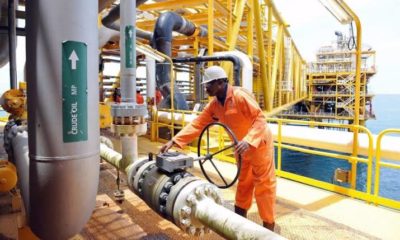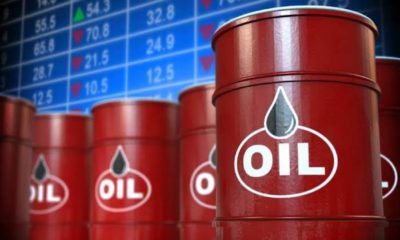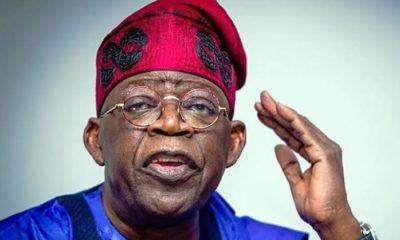Oil
Don’t halt deregulation of petrol, CSOs tell FG

Precious ADELOLA

Crude Oil
ABUJA – A Coalition of Nigerian Civil Society Organizations for Petroleum and Energy Security (CONCSOPES) on Saturday sought the sustenance of deregulation of the price of the Premium Motor Spirit (PMS). S
Speaking at a press conference in Abuja, the convener, Mr. Timothy Ademola, noted that a reversal of the deregulation that started in March 2020 will lead to scarcity of the product, Besides, he said it will lead the Nigerian National Petroleum Corporation (NNPC) to negative financial records. According to him, “With the agitation of labour for the roll back of deregulation, NNPC will inadvertently have to absorb the cost of the price differential between landing cost and pump price.” This would most likely put NNPC in a very bad spot financially and eventually lead to a situation where it would be difficult to further import products. The obvious implication of that is fuel scarcity and the return of fuel queues”. He noted that the organised labour is presently pressing for the reinstatement of petrol regulation. He urged them to partner the NNPC to attain a people – centred deregulation policy.
His words: “If this happens, organized labor that is presently resisting deregulation would be forced to castigate NNPC for not supplying enough fuel to guarantee zero fuel queues and for not making a profit at the end of its financial year.” Truly, the situation calls for a new and bold approach. We suggest that Labour should not just constitute downright opposition to Deregulation but partner with Government on how best to achieve patriotic, people-centered Deregulation; leveraging the new Government policy for the soon resumption of Nigerian Refineries, the approval of Modular Refineries and the welcome development of Dangote Mega Refinery”.
Asked why the government would not rather wait for the operationalization of the refineries before effecting full deregulation, a member of the Coalition, Mr. Henry Adigun, said the Dangote product would not change the petrol price because crude oil is sold at international market rate. He said there is never a time that customers will admit as right for effecting the policy.
He advised that the citizenry endure the temporary change of policy in the downstream sector stressing that can result in price decrease in the long run, Meanwhile, Adigun explained that the deregulation of petroleum downstream is supposed to bring about some sort of liberalization of the sector which would make it possible for all petroleum products marketers to source their products from anywhere and sell at any price dictated by prevailing market forces. According to him, “the competition arising from that would have helped to force pump prices down to the benefit of the citizens.” But the scarcity of foreign exchange has made it difficult for the marketers to import products, thereby making NNPC the sole importer in keeping with its statutory role as marketer of last resort”.
The convener insisted that: “It will do our nation much good if our respected labour leaders spearheading the resistance to deregulation would recognize that deregulation has largely stabilized petroleum products supply over this past year. “Once the foreign exchange issue that has made it difficult for major and independent marketers to engage in importation of petroleum products is resolved, the other gains of deregulation will kick in and Nigerians will be better for it.
“The market stabilization that has been brought about by the past one year of deregulation is strong assurance that full deregulation is the way to go if Nigerians are to enjoy the full benefits of their hydrocarbon wealth.” Resisting deregulation may only slow down our national progress in this regard”.
Earlier, he recalled that last week, the price of crude oil in the international market rallied to $65 per barrel, the highest in thirteen months. This, according to him, was after oil price sank to sub-zero level in the wake of the Covid-19 pandemic in 2020.
He said “Ordinarily, for a country like ours that is heavily dependent on revenues from oil, the price rally should be good news as it portends more money for the government to provide social amenities for the welfare of the citizens.
” But this good news of crude oil price rally is dampened by the prospect of a rise in the pump price of Premium Motor Spirit (petrol). “During the launch of the Nigerian Upstream Cost Optimization Programme (NUCOP) recently, both the Minister of State for Petroleum Resources, Chief Timipre Sylva, and the Group Managing Director of NNPC, Mallam Mele Kyari, hinted at the prospect of a rise in the pump price of petrol in the country in line with the deregulation regime in operation in the downstream, following the rise in the price of crude oil.
Since then, the leadership of organized labour have been vigorously contending that a pump price increase would impose more hardship on Nigerians who are already battling the effect of a sluggish economy. “In Nigeria, the deregulation of petroleum downstream and pump price increase have been very difficult issues that have generated a lot of conflict between the Government and Labour for close to two decades.
“Since 2004 when the Federal Government started the policy of selling the crude oil earmarked for local refining/consumption at international price, it created a situation where the landing price of petroleum products was higher than the regulated pump price of petroleum products in the country. “The old system where crude oil earmarked for local refining/consumption was sold to the NNPC at a subsidized rate was able to take care of price differential between landing cost and regulated pump price. With the new policy, a system of subsidy payment was introduced to take care of the price differential.
But over time, the subsidy system became cumbersome and Government began to find it unsustainable.” The various attempts to end the subsidy regime by deregulating the downstream became a constant subject of bitter conflicts between the government and labour sometimes resulting in debilitating strikes that crippled the national economy.
” In March 2020, Government finally took the bull by the horns and deregulated the downstream by taking advantage of the low oil prices induced by the Covid-19 pandemic. “The Minister of State for Petroleum Resources and the Petroleum Products Pricing Regulatory Agency (PPPRA) stated repeatedly that going forward, the price of PMS would be determined by prevailing market forces.
One of those forces is the price of crude oil. “With the current rise in the price of crude oil, it is inevitable that the price of petrol would go up in the local market. More so when there is no provision in the 2021 Appropriation Act for subsidy payment”.
Oil
NNPC Discovers Over 4,800 Illegal Pipeline Connections

The Nigerian National Petroleum Company (NNPC) Limited has revealed the detection of more than 4,800 unauthorized connections on oil pipelines within the country, painting a troubling image of the nation’s primary source of revenue.
Mele Kyari, the Group Chief Executive Officer of NNPC Ltd, communicated this information to the Senate Committee on Appropriations last Friday.
He said, “We have over 4,800 illegal connections on our pipelines. That means in some lines, within 100 kilometres of pipelines, you have as much as 300 insertions.
“Therefore, even when you produce the oil, you cannot deliver them at the required pressure and therefore the volume will also be less.”
As per the NNPC Ltd chief, individuals from various regions enter the Niger Delta, inserting unauthorized connections on pipelines in Nigeria’s oil-producing area.
This recent revelation follows a prior discovery of 295 illegal connections to the pipelines by the firm a year ago, underscoring the escalating issue of crude oil theft in Nigeria.
Two years earlier, Kyari had highlighted the country’s daily loss of 200,000 barrels of oil, amounting to $13 million due to theft and vandalism.
He further stated “We have two sets of losses, one coming from our products and the other coming from crude oil. In terms of crude losses, it is still going on. On the average, we are losing 200,000 barrels of crude every day.”
After the discovery, Nigeria’s security forces pledged to enhance security around the country’s pipelines.
To bolster this, the Federal Government granted a multi-billion naira pipelines surveillance contract to Tantita Security Services, headed by former militant leader Government Ekpemepulo, also known as Tompolo.
Despite facing criticism for this decision, Senator Heineken Lokpobiri, the Minister of State for Petroleum, remains convinced that it was the appropriate course of action.
In August, following a tour of oil facilities in the Niger Delta, Senator Heineken Lokpobiri expressed gratitude to Tantita, commissioned by NNPC Ltd, for their ongoing work.
He also hinted at plans for further extensive endeavors in the future.
In 2021, after extensive debate and delays, the Petroleum Industry Bill was finally passed to attract increased foreign investment into the oil sector through amendments to regulations, royalties, and taxes.
Oil
Dangote Refinery Set To Begin Fuel Production With First Crude Arrival

Nigeria’s colossal $19 billion Dangote Refinery, after encountering several setbacks, is on the verge of kickstarting fuel production.
This achievement is heralded by the arrival of the first crude shipment, transported by the OTIS tanker carrying 950,000 barrels of Nigeria’s Agbami crude.
S&P Global, citing industry sources and tanker tracking data on spglobal.com, reported the tanker’s departure on December 6, en route to Lekki, the nearest land port to Dangote’s offshore crude receiving terminal.
Scheduled to reach its destination around 8 PM on December 7, the arrival of this shipment signifies the commencement of crude supplies for the refinery’s operations.
Chartered by the state-owned Nigerian National Petroleum Company (NNPC), the Suezmax tanker is an emblem of the initial crude supply to Dangote’s cutting-edge refinery, as disclosed by a West African oil trader familiar with the matter in the S&P report.
Even though the refinery was officially completed in May, the absence of domestic crude feedstock had hindered oil product manufacturing.
To address this, the NNPC, holding a 20% stake in the refinery, struck an agreement to provide 6 million barrels of crude oil as feedstock to the Dangote refinery in December.
This move aims to jumpstart operations and overcome the previous impediments.
Agbami, operated by Chevron, holds a prominent position among Nigeria’s major deepwater developments, producing around 100,000 barrels per day in the central Niger Delta.
Known for its light sweet crude qualities, with a specific gravity of 47.9 API and a low sulfur content of 0.04%, Agbami produces substantial amounts of naphtha and kerosene.
NNPC has chartered additional shipments from different Nigerian offshore fields to the refinery, marking the start of a sequence of planned crude supplies for the month, as mentioned by the oil trader.
Located on the outskirts of Lagos, Nigeria’s commercial hub, the Dangote Refinery encountered repeated delays since its 2013 announcement, despite significant installation progress in 2019.
The refinery, designed to handle multiple crudes simultaneously, targets three Nigerian crude grades—Escravos, Bonny Light, and Forcados. When operating at full capacity, it aims to produce 327,000 barrels per day (b/d) of gasoline, 244,000 b/d of gasoil/diesel, 56,000 b/d of jet fuel/kerosene, and 290,000 metric tons per year of propane/LPG.
Dangote’s operations starting signify Nigeria’s hopes to lessen its reliance on gasoline imports, addressing the deficiencies of its existing refineries undergoing repairs. This shift is poised to reshape Nigeria’s oil industry, potentially leading to gasoline self-sufficiency by the 2040s.
Dangote officials anticipate an initial output of 370,000 barrels per day (b/d), emphasizing jet fuel and diesel production.
Industry analysts, however, project the refinery to reach its full operational capacity by mid-2025, although potential delays remain a looming concern.
Oil
NNPCL Sets Dec 2024 Terminal Date For Fuel Importation

The Nigerian National Petroleum Company Limited (NNPCL) has announced intentions to cease importing refined petroleum products by December 2024, anticipating full operational functionality for all national refineries by that time.
Group CEO, NNPC Ltd, Mele Kyari, shared this at a meeting with Speaker Tajudeen Abbas of the House of Representatives, who advocated for the privatisation of Nigeria’s refineries on Thursday.
Projections indicated the national oil firm’s revenue could climb to N4.5 trillion by the conclusion of 2023. Moreover, the rehabilitation of the Port Harcourt Refining Company, managed by NNPCL, was slated for completion by December of the current year.
Meanwhile, Oil marketers verified on Thursday that the Port Harcourt refinery is set for operations, potentially starting in January 2024. They emphasized that once operational, this refinery could notably reduce the prices of refined petroleum products.
During the meeting in Abuja, Kyari asserted Nigeria’s intention to cease importing refined petroleum products by 2024, envisioning the country’s emergence as a net exporter of these commodities within the same year.
He outlined the plans for launching operations at the Port Harcourt, Warri, and Kaduna refineries.
Kyari reiterated that all refineries would operate at full capacity, ultimately paving the way for Nigeria to transition into a net exporter of petroleum products by the conclusion of 2024.
He attributed the inactivity of Nigeria’s refineries over the years to the petroleum subsidy, emphasizing that the removal of this subsidy was drawing significant private-sector investments into the sector.
Kyari said “I can confirm to you that by the end of December this year, we will start the Port Harcourt refinery; early in the first quarter of 2024, we will start the Warri refinery and by the end of 2024, Kaduna refinery will come into operation.
“This is the commitment we are giving today and you can hold us accountable for this. In 2024, many of the initiatives including the rehabilitation of our refineries and also the efforts of small-scale refineries, and the upcoming Dangote refinery, will make Nigeria a net exporter of petroleum products in 2024.
“We will no longer be talking about fuel importation by the end of 2024. I am very optimistic that this will crystallise.
Kyari promised that by the conclusion of 2023, the government’s anticipated revenue from the company would reach N4.5 trillion, emphasizing NNPCL’s adherence to the Petroleum Industry Act and its commitment to delivering value to shareholders.
Recall that in October 2023, it was reported that Nigeria’s monthly spending on the importation of Premium Motor Spirit, known as petrol, had reached approximately N843 billion due to NNPCL’s cessation of oil swaps.
In July of this year, the Nigerian Midstream and Downstream Petroleum Regulatory Authority reported that during the post-deregulation period, spanning June 1 to June 28, 2023, the country’s total petrol consumption amounted to 1.36 billion litres, with an average daily consumption of 48.43 million litres.
The average ex-depot price of petrol, sourced solely from NNPCL as the importer, stands at about N580 per litre.
However, both NNPCL and oil marketers declared on Thursday that this substantial oil import expenditure would soon diminish.
They anticipated a drop once the Port Harcourt refinery commences production of refined petroleum products from January 2024, barring any unforeseen circumstances.






















